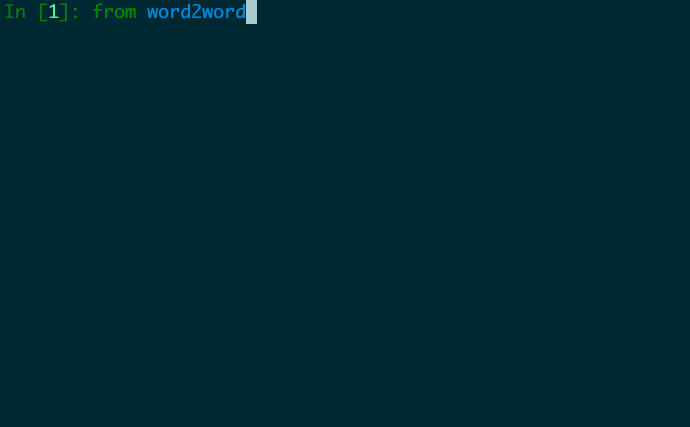# word2word
Easy-to-use word-to-word translations for 3,564 language pairs.
Key Features
- A large collection of freely & publicly available word-to-word translations
for 3,564 language pairs across 62 unique languages. - Easy-to-use Python interface.
- Constructed using an efficient approach that is quantitatively examined by
proficient bilingual human labelers.
Usage
First, install the package using pip:
pip install word2word
Alternatively:
git clone https://github.com/Kyubyong/word2word.git
python setup.py install
Then, in Python, download the model and retrieve top-k word translations
of any given word to the desired language:
from word2word import Word2word
en2fr = Word2word("en", "fr")
print(en2fr("apple"))
# out: ['pomme', 'pommes', 'pommier', 'tartes', 'fleurs']
print(en2fr("worked", n_best=2))
# out: ['travaillé', 'travaillait']
en2zh = Word2word("en", "zh_cn")
print(en2zh("teacher"))
# out: ['老师', '教师', '学生', '导师', '墨盒']

Supported Languages
We provide top-k word-to-word translations across all available pairs
from OpenSubtitles2018.
This amounts to a total of 3,564 language pairs across 62 unique languages.
The full list is provided here.
Methodology
Our approach computes the top-k word-to-word translations based on
the co-occurrence statistics between cross-lingual word pairs in a parallel corpus.
We additionally introduce a correction term that controls for any confounding effect
coming from other source words within the same sentence.
The resulting method is an efficient and scalable approach that allows us to
construct large bilingual dictionaries from any given parallel corpus.
For more details, see the Methods section of our paper draft.
Comparisons with Existing Software
A popular publicly available dataset of word-to-word translations is
facebookresearch/MUSE, which
includes 110 bilingual dictionaries that are built from Facebook's internal translation tool.
In comparison to MUSE, word2word does not rely on a translation software
and contains much larger sets of language pairs (3,564).
word2word also provides the top-k word-to-word translations for up to 100k words
(compared to 5~10k words in MUSE) and can be applied to any language pairs
for which there is a parallel corpus.
In terms of quality, while a direct comparison between the two methods is difficult,
we did notice that MUSE's bilingual dictionaries involving non-European languages may be not as useful.
For English-Vietnamese, we found that 80% of the 1,500 word pairs in
the validation set had the same word twice as a pair
(e.g. crimson-crimson, Suzuki-Suzuki, Randall-Randall).
For more details, see Appendix in our paper draft.
References
If you use our software for research, please cite:
@misc{word2word2019,
author = {Park, Kyubyong and Kim, Dongwoo and Choe, Yo Joong},
title = {word2word},
year = {2019},
publisher = {GitHub},
journal = {GitHub repository},
howpublished = {\url{https://github.com/Kyubyong/word2word}}
}
(We may later update this bibtex with a reference to our paper report.)
All of our word-to-word translations were constructed from the publicly available
OpenSubtitles2018 dataset:
@article{opensubtitles2016,
title={Opensubtitles2016: Extracting large parallel corpora from movie and tv subtitles},
author={Lison, Pierre and Tiedemann, J{\"o}rg},
year={2016},
publisher={European Language Resources Association}
}




